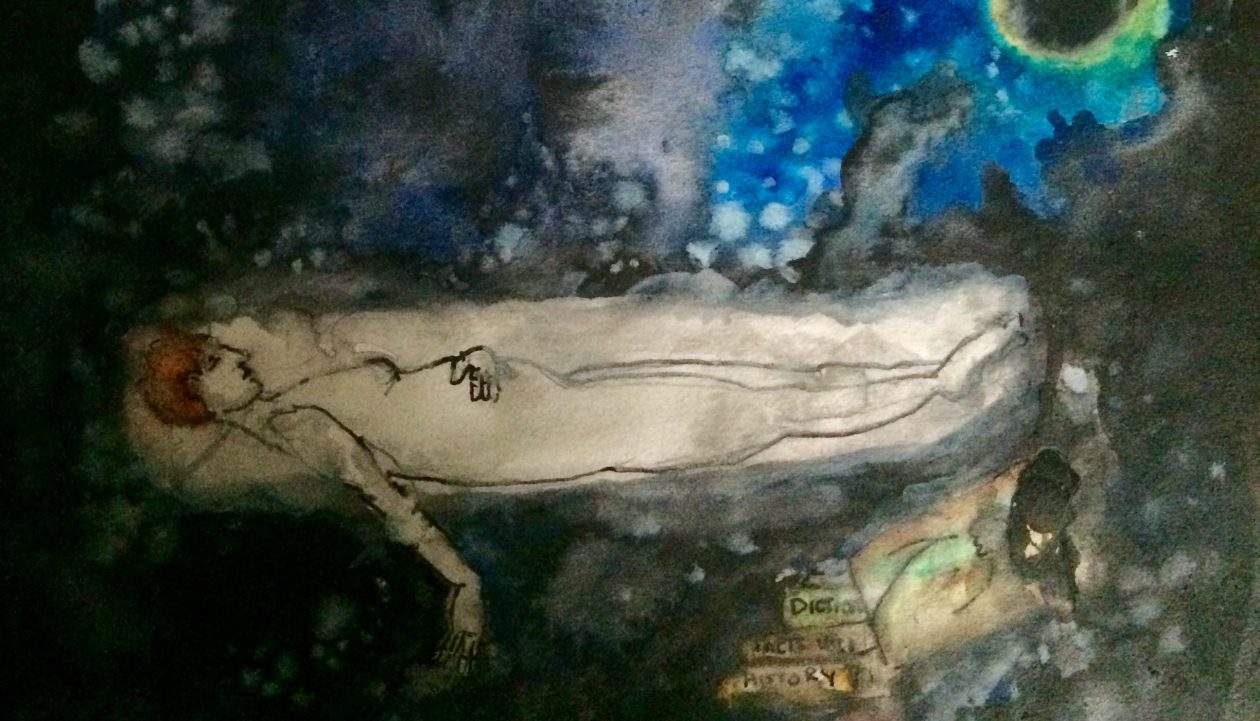
I have been seeing my (former? eternal? sometimes? on-off?) therapist over zoom for the past few weeks. I needed him again when quarintine began; those first few weeks my internal world collapsed and he responded to my claustrophobia and desperation by giving me some chewy interpretations, the kind that need gnawing before I can swallow them. One of his interventions was as tough as beef jerky: ‘It is all too neat,’ he said, referencing some of the relational moves I was recounting. His face froze on the screen, his voice lagged. I missed the smell of his consulting room, the joke we make as I come in and hang up my coat, the seat I always choose to sit in and the history it gestures to when I say, ‘I won’t be lying down on that thing,’ pointing at the couch. ‘There is trouble with my wi-fi,’ I say, apologetically. The silences are not quite so natural, but we find a rhythm.
It takes two hours for the five year old to fall asleep every night at bedtime; I am exhausted by the end of our tussling and often fall asleep next to him. He is wired, wild, screechy, tired. I get it, no school, he is adjusting too, but the fourteen hour day with no evening is getting to me. I call a good friend (who also dabbles in the dark arts of respectful parenting) for some advice, hoping for a magic bullet or a potion or some kind of easy to follow formula. Instead she gives me some wise words, riddles and some perspective, and then we hang up. Unwinding is a process, a set of skills maybe, and I do what I can to help: I put my half remembered baby massage knowledge into play, I light a candle and we listen to accousitc guitar ballads until he is sleepy. I read him stories and I offer to hold him. I bought him lavendar pillow spray in full knowldge it is probably a con, but hey, maybe it adds to the calming ceremony. It still takes about two hours for him to unwind. Result? Another confession: my yoga practice is erratic right now. In the honeymoon period, I used to wake up at 6 and do an hour a day, seven days a week. At the moment sometimes all I can coax myself into is a minute in mountain pose before I make coffee. Other mornings I manage half an hour after lounging in bed smelling the cats head and reading the same sentence over and over again. I was so proud of my routine before, my serenity, my ability to self-regulate with a forward bend and now I am humbled by how little I can manage most days.
My sisters jokingly call me, ‘guru Di,’ because I often step into the role of advice giving bossy older sister. When I was a kid I would make little mud huts for my miniature plastic dolls, lovely, neat little huts with carefully stacked piles of evenly snapped twigs and painstaingly lined pebble paths. I could spend hours forming thick little walls and pushing them into perfectly arranged squares and grids. The play was satisying. It was soothing, absorbing, numbing play. I guess it was my way of coping with the chaos of my childhood. But I think my old ways of coping: neat, tidy dogma, mud hut walls, tip-of-my-tongue advice, pat answers, are not enough now. They do not go deep enough into the relational mess of love and life. In psychoanalytic terms, they do not enter into the dyadic realm of ‘mis-attune, rupture, repair,’ the relational dynamics that make trust and growth possible. This is sacred ground and I hate it, I am uneasy here, I am challenged and I am scared. I don’t have the right sentences, I don’t have the right words to make it all better. ‘When you, I feel,’ only gets you so far.
‘Are there any good metaphors for therapy?’ I asked over zoom, we were both laughing. Over the years we have joked about how awful so many of the metaphors are: suitcases, mazes, balls of wool. We spent a few minutes critiquing them and then I ventured, ‘sloppy…’ I had been re-reading Daniel Stern’s gorgeous book on intersubjective consciousness and I loved his use of that word to describe moments of meeting between people. Maybe sloppy is a good metaphor for therapy, for relationships, espcially for those of us who can turn to rigid, formulaic ways of being-with in times of stress. ‘I don’t think it will get you any new clients,’ I add, just before our session ends. I like the frog plop, muddy sound of the word, the way it makes my skin crawl with shame and discomfort, the picture it conjures of something that isn’t quite right, the wrong shape, too loud, too invasive, too abject, badly made, risky, an image that doesn’t quite fit the diagram.
Copyright Psychegeographer 2020
Daniel Stern, psychotherapist and infant researcher writes movingly and precisely about many of the subtle invisible processes of therapy in his book, The Present Moment


Good to see you back in the saddle!
LikeLiked by 1 person
Ah thanks Ben!! Yeeehhhaaaawwww
LikeLike